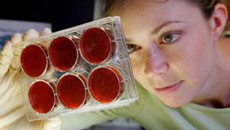There is good news for patients suffering from type-one diabetes as they may soon be able to do away with their daily insulin dose to manage their blood-sugar levels.
Researchers have found that a peptide called caerulein can convert existing cells in the pancreas into those cells destroyed in type-one diabetes-insulin-producing beta cells.
"We have found a promising technique for type-one diabetics to restore the body's ability to produce insulin," said Fred Levine, a professor at Sanford-Burnham Medical Research Institute in the US.
"By introducing caerulein to the pancreas, we were able to generate new beta cells - the cells that produce insulin," Levine added.
The study first examined how mice in which almost all beta cells were destroyed - similar to humans with type-one diabetes - responded to injections of caerulein.
In those mice, but not in normal mice, they found that caerulein caused existing alpha cells in the pancreas to differentiate into insulin-producing beta cells.
The research team then examined human pancreatic tissue from type-one diabetics, finding strong evidence that the same process induced by caerulein also occurred in the pancreases of those individuals.
Caerulein is a peptide originally discovered in the skin of Australian Blue Mountains tree frogs.
It stimulates gastric, biliary, and pancreatic secretions, and has been used in humans as a diagnostic tool in pancreatic diseases.
An estimated over 300 million people worldwide are living with type-one diabetes.
The study appeared in the journal Cell Death and Disease.





